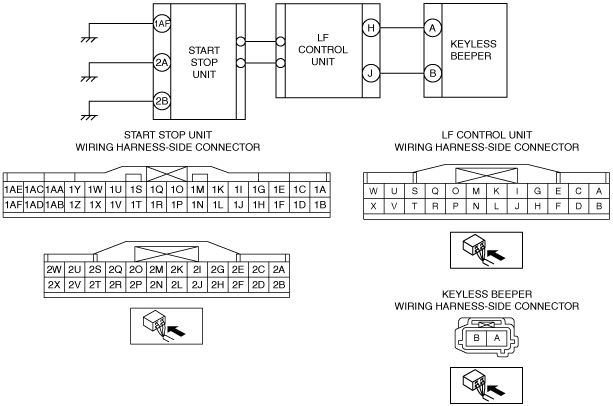|
1
|
VERIFY PERSONALIZATION FEATURES SETTING
• Verify the volume of the keyless beeper for the personalization features.
• Has the volume of the keyless beeper been set to off?
|
Yes
|
Set the volume so that the keyless beeper sounds and verify the operation.
Operation is verified:
• Troubleshooting completed. (Explain the servicing contents to the customer.)
Operation is not verified:
• Go to the next step.
|
|
No
|
Go to the next step.
|
|
2
|
INSPECT IF MALFUNCTION CAUSE IS SHORT TO GROUND IN WIRING HARNESS BETWEEN KEYLESS BEEPER AND LF CONTROL UNIT
• Disconnect the negative battery terminal.
• Disconnect the LF control unit connector.
• Inspect for continuity between the following wiring harness terminals (vehicle wiring harness side) and body ground.
-
― LF control unit terminal H
― LF control unit terminal J
• Is there continuity?
|
Yes
|
• Refer to the wiring diagram and verify if there is a common connector between the following terminals.
-
― Keyless beeper terminal A and LF control unit terminal H
― Keyless beeper terminal B and LF control unit terminal J
If there is a common connector:
-
• Inspect the common connector and terminals for corrosion, damage, or disconnection and the common wiring harnesses for an short to ground to determine the malfunctioning location.
• Repair or replace the malfunctioning location.
If there is no common connector:
-
• Repair or replace the wiring harness which has an short to ground.
• After replacement, go to Step 6.
|
|
No
|
Go to the next step.
|
|
3
|
INSPECT IF MALFUNCTION CAUSE IS SHORT TO POWER SUPPLY IN WIRING HARNESS BETWEEN KEYLESS BEEPER AND LF CONTROL UNIT
• Verify that the LF control unit connector is disconnected.
• Connect the negative battery terminal.
• Measure the voltage at the following terminals (vehicle wiring harness).
-
― LF control unit terminal H
― LF control unit terminal J
• Is there any voltage?
|
Yes
|
• Refer to the wiring diagram and verify if there is a common connector between the following terminals.
-
― Keyless beeper terminal A and LF control unit terminal H
― Keyless beeper terminal B and LF control unit terminal J
If there is a common connector:
-
• Inspect the common connector and terminals for corrosion, damage, or disconnection and the common wiring harnesses for an short to power supply to determine the malfunctioning location.
• Repair or replace the malfunctioning location.
If there is no common connector:
-
• Repair or replace the wiring harness which has an short to power supply.
• After replacement, go to Step 6.
|
|
No
|
Go to the next step.
|
|
4
|
INSPECT IF MALFUNCTION CAUSE IS OPEN CIRCUIT IN WIRING HARNESS BETWEEN START STOP UNIT AND GROUND
• Disconnect the negative battery terminal.
• Verify that the start stop unit connector is disconnected.
• Inspect for continuity between the following terminals (vehicle wiring harness).
-
― Start stop unit terminal 1AF and ground
― Start stop unit terminal 2A and ground
― Start stop unit terminal 2B and ground
• Is there continuity?
|
Yes
|
Go to the next step.
|
|
No
|
• Refer to the wiring diagram and verify if there is a common connector between the following terminals.
-
― Start stop unit terminal 1AF and ground
― Start stop unit terminal 2A and ground
― Start stop unit terminal 2B and ground
If there is a common connector:
-
• Inspect the common connector and terminals for corrosion, damage, or disconnection and the common wiring harnesses for an open circuit to determine the malfunctioning location.
• Repair or replace the malfunctioning location.
If there is no common connector:
-
• Repair or replace the wiring harness which has an open circuit.
• After replacement, go to Step 6.
|
|
5
|
INSPECT IF MALFUNCTION CAUSE IS OPEN CIRCUIT IN WIRING HARNESS BETWEEN KEYLESS BEEPER AND LF CONTROL UNIT OR KEYLESS BEEPER
• Disconnect the keyless beeper connector
• Inspect for continuity between the following terminals (vehicle wiring harness).
-
― Keyless beeper terminal A and LF control unit terminal H
― Keyless beeper terminal B and LF control unit terminal J
• Is there continuity?
|
Yes
|
• Replace the keyless beeper.
• After replacement, go to the next step.
|
|
No
|
• Refer to the wiring diagram and verify if there is a common connector between the following terminals.
-
― Keyless beeper terminal A and LF control unit terminal H
― Keyless beeper terminal B and LF control unit terminal J
If there is a common connector:
-
• Inspect the common connector and terminals for corrosion, damage, or disconnection and the common wiring harnesses for an open circuit to determine the malfunctioning location.
• Repair or replace the malfunctioning location.
If there is no common connector:
-
• Repair or replace the wiring harness which has an open circuit.
• After replacement, go to the next step.
|
|
6
|
VERIFY IF MALFUNCTION CAUSE WAS CORRECTED
• Does the keyless beeper sound?
|
Yes
|
Troubleshooting completed. (Explain the contents of the servicing to the customer.)
|
|
No
|
If the malfunction has not been resolved, repeat the inspection from Step 1.
|
